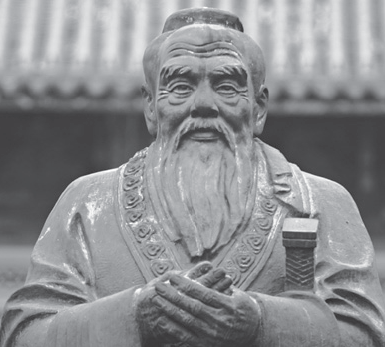The ancient Chinese philosopher Confucius (551–479 BC) wrote one of the most influential books in history, the Analects, and founded the ethical and moral system that bears his name. But despite his great influence on Asian culture and society, very little is known about his life.

According to legend, Confucius was born into a poor but respected family in what is now eastern China, in the kingdom of Lu. After working as a bookkeeper, shepherd, and teacher, Confucius eventually became an official for the local duke. Although a capable administrator, he quit his job for political reasons about thirty years later, perhaps in disgust over the ruler’s hedonistic lifestyle.
However, Confucius’s decades of experience in the duke’s court had given him many ideas about good government, a topic of widespread concern during that period of China’s history. At the time, known as the Spring and Autumn Period (722–481 BC), the country was nominally under the control of the emperor, but in fact it was divided into several quasi-independent, feuding kingdoms.
The Analects, compiled by Confucius’s followers after his death, contains the core tenets of Confucianism. The book has no narrative and is instead a collection of short stories and aphorisms meant to illustrate his key moral concepts. For instance, one section about politics reads:
The Master said, “He who exercises government by means of his virtue may be compared to the north polar star, which keeps its place and all the stars turn towards it.”
The metaphor underscores the importance in Confucian thought of the virtuous ruler, who Confucius believed should be a moral example to the nation.
Although Confucius did not claim to be divine and Confucianism is not a religion, his writings continued to spread after his death at age seventy-three and would be one of the bases of Chinese society.
ADDITIONAL FACTS
- Confucius survived an assassination attempt when he was in his late fifties and later accepted the would-be assassin’s brother as his student.
- In addition to the Analects, Confucius also wrote a book of poetry and Spring and Autumn Annals, a chronicle of his home kingdom of Lu.
- During China’s Cultural Revolution from 1966 to 1976, Communist leader Mao Zedong (1893–1976) labeled Confucius a “stinking reactionary” and attacked Confucianism as a backward set of beliefs that had held back China’s progress. Mao’s Red Guards even vandalized a temple marking the spot of Confucius’s birth. After Mao’s death, however, China’s leadership quickly rehabilitated Confucianism.
